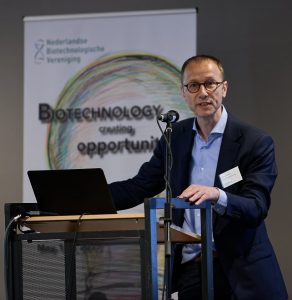Welcome to our feature A word from the expert. In this feature, we introduce someone who has organized a conference in our region or will do so in the future. This month, we introduce with pleasure Dr. ir. Emile van de Sandt | Director Research & Development | DSM Sinochem Pharmaceuticals.
1. Why did you choose your specialism?
“At school I always liked the more exact subjects. When looking for a study I have chosen Chemical Engineering as in my view it should be great to be involved in the development, design, scale-up, improvement and operations of production processes. Factories, able to convert raw materials into final products, was fascinating me, especially when doing this in a sustainable way and taking care of the environment. I did my master at Delft University, where I also did my PhD. That was also on a subject which was very much related to the environment: the development of a process to convert the harmful CFCs (Chlorofluorcarbons, known from the refrigerators, depleting the ozone layer) into useful chemicals. In 1996 I started working at Gist-brocades, nowadays DSM, where biotechnology and microbes in fermenters are used for producing products. Also this is generally much more environmental friendly when compared to chemical routes. For a long time my specialism is downstream processing, the purification of products from the fermentor and complex mixtures. Since last year I am the R&D director of DSM Sinochem Pharmaceuticals, where we produce antibiotics (lifesaving drugs) and other products like statins (cholesterol lowering medicines) via biotechnology in a sustainable way and continuously are working to do this more efficiently.”
2. Which conference have you managed to acquire for the Maastricht Region? Which USP’s did you use?
“As chairman of the Dutch Society of Biotechnology we were able to acquire the European Conference of Biotechnology 2020. Different selling points have convinced the jury such as the strong local organizing committee, the industry involvement, strong academic network, and the role of the Netherlands is building the biobased economy.”
3. Which were the competitive cities and what was the decisive reason to choose for Maastricht?
“Other well-known conference cities have submitted a bid as well. Decisive was the excellent facilities of the MECC, the appeal of Maastricht as a vibrant, accessible biotechnology hub with strong academic links, options to visit Brightlands Chemelot Campus and research labs in the Maastricht University Medical Centre and the Maastricht University and finally the enthusiasm and commitment of the Dutch Society of Biotechnology and the Maastricht Convention Bureau to win the bid, as demonstrated during the site visit last November.”
4. What important themes will be discussed during the conference?
“New development and scientific highlights will be essential in our conference but also the industrial application of the science in real practice will be clearly present. The different application fields, such as (bio)pharmaceuticals, plant, food, agriculture, biomaterials will all be addressed and the different competences involved such as genetics, fermentation, synthetic biology, bioengineering and bioprocessing. Next to that quite some attention for young persons as they are key for the future of our field.”
5. What does the Maastricht Convention Bureau mean to you?
“I really want to thank the MCB for their efforts to make a very professional bid, their connections with the different stakeholders, arrangement of financial support and the organization of the site visit. This were instrumental in winning the bid and we are looking forward to the organize the ECB2020 together with them.”
Earlier editions of this feature:
- Prof dr Erik AL Biessen, PhD, Experimental Vascular Pathology group | Department of Pathology | MUMC+ and Institute for Molecular Cardiovascular Research | RWTH Klinikum Aachen -June 2017
- prof Pamela Habibović, Chair Department of Instructive Biomaterials Engineering at the MERLN Institute for Technology-Inspired Regenerative Medicine – May 2017
- prof Kleinjans, PhD of the department Toxicogenomics of the Maastricht University – April 2017

